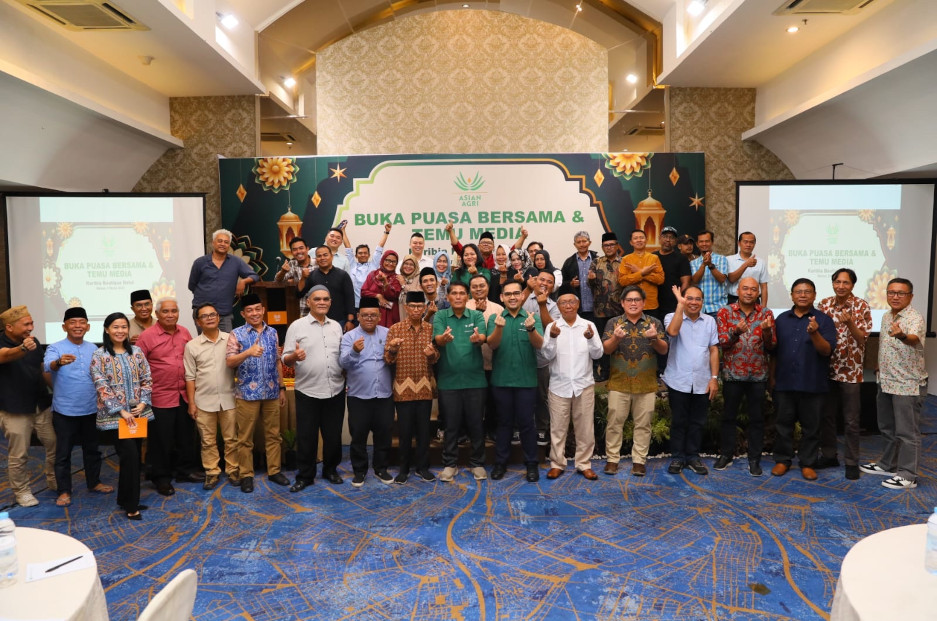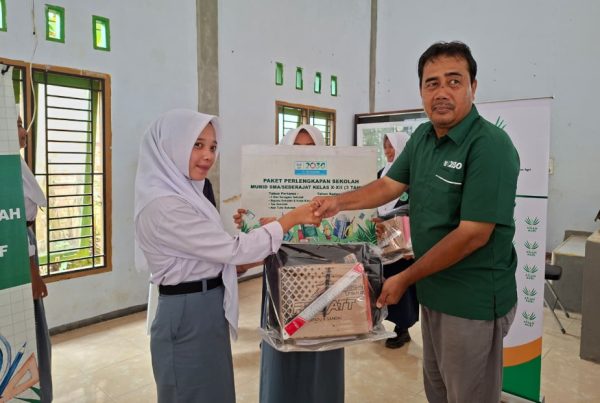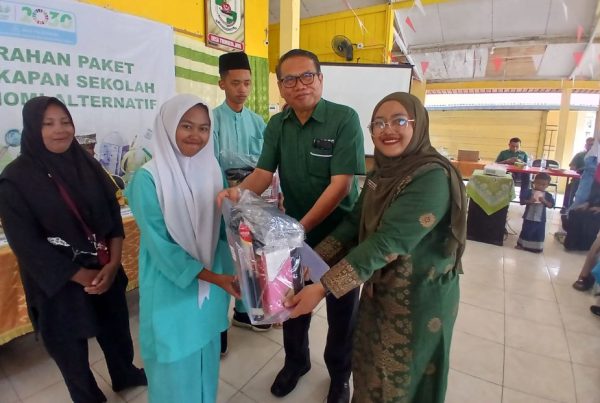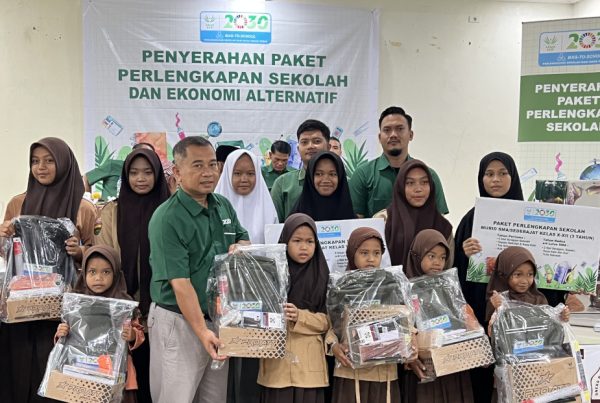Medan, 5 March 2025 – Asian Agri hosted a fast-breaking (buka puasa) event with the media at Hotel Karibia in Medan, North Sumatra, on March 5, 2025. The event served as a token of appreciation for the media’s crucial role in delivering information with the public.
“This buka puasa event is very meaningful to us, as the media and the company support each other in the business ecosystem. The synergy between us is important for progress and sustainability. We hope this event can strengthen and further develop the good relationship we have built. On this occasion, we would like to highlight Asian Agri’s role in supporting the palm oil industry through the innovative Topaz seed. Topaz is a proven, high-quality seed that has been shown to enhance palm oil tree productivity,” said The Regional Head of North Sumatra, Herman Sembiring.
A senior journalist and Press Card Number One (PCNO) holder, War Djamil, speaking on behalf of the media in North Sumatra, stated, “The media will continue to support private companies in delivering useful information to the public, as these companies play a crucial role in generating foreign exchange and creating jobs for the community.”
The Head of Plant Breeding at Asian Agri, Yopy Dedywiryanto explained that the Topaz seed is a superior palm oil product developed through years of research by the company and has been proven to boost palm tree productivity. “Asian Agri is committed to delivering the best and becoming a sustainable company. To achieve this, we focus on research and development to obtain the best cultivation practices and planting materials. In 1989, we established a research and development facility in Tebing Tinggi, North Sumatra, with the goal of setting the standard for the best cultivation practices. Then, in 1992, Asian Agri, through the Oil Palm Research Station (OPRS), began selecting the best Dura and Pisifera parent lines from Costa Rica to develop superior planting materials.”
The advantages of the Topaz seed became evident when four varieties were released in 2004—Topaz 1, Topaz 2, Topaz 3, and Topaz 4. Based on multi-location testing in North Sumatra and Riau, across three different soil types, these varieties showed high productivity. As a result, the Topaz seed is well-suited to adapt to various locations across Indonesia,” he said.
The testing did not stop at the first generation. “We continued testing up to the second generation, which is directly descended from the original seeds planted at the OPRS Topaz in 1996. Based on comprehensive and intensive second-generation testing, Topaz now produces crosses that have been proven to yield 24 tons of Fresh Fruit Bunches (FFB) in Year 1, an average of 38 tons/ha from Year 3 to Year 6, with an Oil Extraction Rate (OER) of 29% and a potential of more than 10 tons of Crude Palm Oil (CPO)/ha. In line with our commitment to provide the best for our customers, in 2019, OPRS released the DxP Topaz GT variety, based on testing with the most aggressive Ganoderma isolates, allowing Topaz GT to adapt better in areas with high Ganoderma attack rates,” he added.
Yopy also explained that initially, the Topaz seed was mostly planted by independent smallholders, and it was through these smallholders that the Topaz seed became widely known. “Smallholders who have planted Topaz are very satisfied with the results. Especially when partnering with Asian Agri, they receive guidance on Best Management Practices from the company,” he said.
A smallholder from Aek Songsongan Village in North Sumatra’s Asahan Regency, Riko Simamora, shared his experience with the Topaz seed. “Selecting quality seeds is key to achieving the best harvests. Before becoming a smallholder, I worked in the plantation industry and observed various types of high-quality seeds being used. From the production data, I noticed that the Topaz seeds from Asian Agri yielded better results compared to others. At 33 months, using only half of the recommended fertilizer dosage, my plantation was already producing 1 ton/ha/month. This clearly demonstrates a significant boost in production with Topaz,” Riko said.
In 2018, Riko decided to become a smallholder and manage his own plantation using Topaz seeds. “When I started my plantation, I knew Topaz was a high-yielding seed. However, I was hesitant because one of the Topaz varieties has green fruit, known as ‘Malaysia fruit.’ I was concerned it would be hard to sell, but after receiving assurances from the producer, Asian Agri, I decided to continue planting Topaz. The results have been very satisfying. At around 33 months, it produced 1 ton/ha/month, 1.8 tons/ha/month at 2 years, and 2.2 tons/ha/month at 5 years,” Riko said. Yopy also clarified that there is no significant difference in TBS production or oil extraction rates between the green (Virescence) and black (Nigrescence) fruit.
About Asian Agri
Founded in 1979, Asian Agri is one of Indonesia’s leading palm oil companies, managing more than 100,000 hectares of plantations and employing over 20,000 people.
As a pioneer of the Government’s Transmigration Integrated Plantation Program (PIR-Trans), Asian Agri has partnered with 30,000 plasma farmers in Riau and Jambi, collectively managing 60,000 hectares of palm oil plantations. The company also partners with independent farmers to improve their welfare and promote socio-economic growth.
Through its commitment to sustainable practices, Asian Agri upholds a no-burning policy and implements best plantation practices to help plasma farmers increase productivity, yields, and supply chain traceability while supporting their journey to certification. Asian Agri’s mills utilize advanced technology and self-generated green energy to minimize greenhouse gas emissions.
Both Asian Agri plantations and plasma farmer plantations are fully certified by the Roundtable on Sustainable Palm Oil (RSPO) and International Sustainability & Carbon Certification (ISCC), underscoring the company’s commitment to responsible and sustainable palm oil production.
Visit Asian Agri’s website and for more information, please contact:
Corporate Communication, Asian Agri
E-mail: communications@asianagri.com





